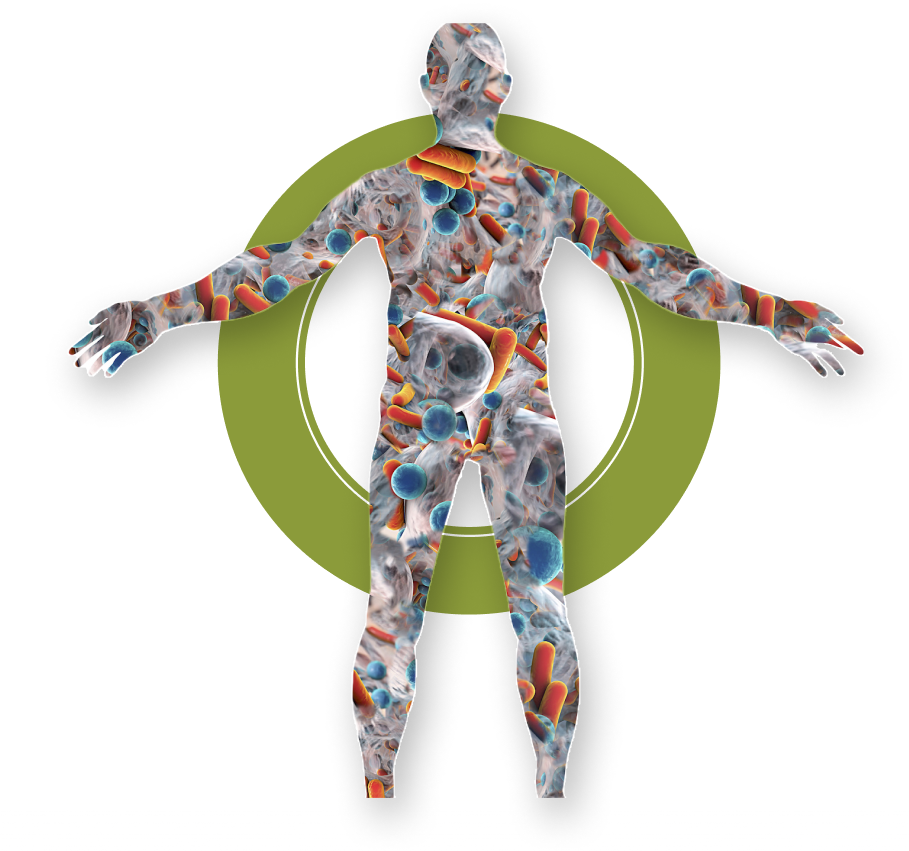

One of the largest body sites that microorganisms like to populate is the gut. The gut contains 95% percent of our microbiota. Our microbiota plays an important role in digestion and the syntheses of vitamins; the development and maintenance of the immune system; communication with the brain and other tissues, and many more amazing processes.
Microorganisms outnumber our own cells by ten-to-one; Humans are made up of approximately ten trillion cells while our hidden microbial world that inhabits us has one hundred trillion cells.
The microbiome is the collection of all the genomes and genes housed in the microbiota. In us, the human genome contributes to approximately 23,000 genes that make us, well us! Many changes in the gut microbiota have been linked to a whole array of disorders and disease states including depression, food intolerance, obesity, cancer, inflammatory bowel disease and chronic disease.


A graduate of the Functional Nutrition Course
Looking to develop your knowledge and understanding of the microbiome
Passionate about helping people understand the importance of gut health
Working in the health industry and looking to enhance your existing career
Prior learning is recognised by application
Can you believe it`s as simple as getting out into the sun, breathing fresh air, drinking clean, filtered water and eating natural foods? Forget pills, rigid routines, hour-long HIIT sessions, and bingeing superfoods. Just follow the fundamentals for good health.

Finished your meal but still hungry? Give leptin thirty minutes to work its magic before you decide to keep eating.

Has The Nutrition Academy changed your health? Tell us about it below!

Reach out to us via email admin@thenutrition.academy, give us a call 0421977604, or shoot us a DM if you`re interested in learning more about The Nutrition Academy.

Watch the full video of Cyndi creating sauerkraut on our YouTube channel! Head over there now!
↳ follow the link in our bio

The polyphenols found in delicious vegetation like berries, peppercorns, cocoa powder and olives, boost the antioxidant enzymes in your body, calming inflammation, supporting blood vessel function, and feeding beneficial gut bacteria. It may surprise you that we eat a compound which is meant to `deter` pests, but humans love to eat anything sour or bitter.

Sometimes, we can`t help what life throws at us, but we can take strength in reacting proactively and making decisions that align with our values no matter what, ensuring we reach a desired outcome. When was a time you were proud of yourself for adjusting your sail and keeping moving? Let us know below!

Come back on Thursday to watch Cyndi make sauerkraut and show you just how easy it really is.

Our course is not like others you see online. It`s written by a well-respected biomedical scientist professor at the University of Tasmania and packed full of information from varying sources to educate you on a huge range of topics. To learn more, read about it on our website!
↳ follow the link in our bio

If you`ve ever turned to the internet for health advice and found yourself overwhelmed and bombed with contradictory advice that wouldn`t work for you in practice, turn off the noise. There`s a flexible, realistic and life-changing option for you.
Learn about being a locavore and get the opportunity to study more about ancestral eating, human anthropology and nutrition science with Cyndi O`Meara. Join us on Monday 23rd at 7:00pm AEST. Sign up here: https://us02web.zoom.us/meeting/register/v16VmuY1SSekNyO5btTbdA

Do you have Doctor Merriment, Dr Sleep and Dr Diet in your life?

Learn how to read labels, understand sneaky ingredient terms, what to look for on packaging and more with our Introduction to Nutrition course. Enrol now!
↳ follow the link in our bio
